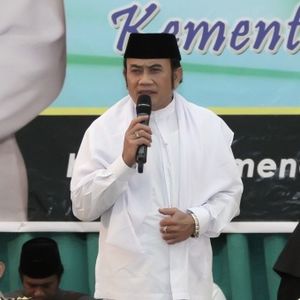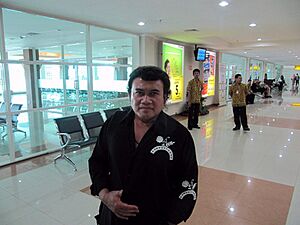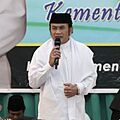Rhoma Irama facts for kids
Quick facts for kids
Rhoma Irama
|
|
|---|---|

Rhoma Irama gave a talk in Palembang, 2015
|
|
| Member of People's Representative Council | |
| In office 1 October 1997 – 1 October 1999 |
|
| President | Suharto B.J. Habibie |
| Parliamentary group | F-KP |
| Constituency | Jakarta |
| Personal details | |
| Born |
Oma Irama
11 December 1946 Tasikmalaya, West Java, Indonesia |
| Political party | Golkar |
| Other political affiliations |
Idaman (2015–2018) |
| Spouses |
|
| Children | 5, including Debby Irama, Vicky Irama, and Ridho Rhoma |
| Occupation |
|
| Signature |  |
| Musical career | |
| Also known as | Raja Dangdut (King of Dangdut) |
| Genres | Dangdut |
| Instruments |
|
| Years active | 1958–present |
| Labels |
|
Raden Haji Oma Irama, who is famous as Rhoma Irama, is an Indonesian singer, songwriter, and guitarist. Born on December 11, 1946, he is known as the "Raja Dangdut," which means "the King of Dangdut." Dangdut is a popular style of Indonesian music.
Rhoma Irama started his music career in the late 1960s. He was one of the first musicians to create the dangdut sound. He later formed his own band, Soneta Group. With this group, he became a huge star. His music mixed sounds from Western rock, Malay music, and even Indian Bollywood movies.
Starting in the late 1970s, his music began to have more Islamic themes. He became a major figure in religious pop music in Indonesia. Besides music, Rhoma Irama has also acted in many movies. He has also been involved in politics, using his fame to support causes he believes in.
Contents
Early Life and Background
Rhoma Irama was born in Tasikmalaya, West Java, Indonesia. His parents were Raden Burdah Anggawirya and R. Hj. Tuti Juariah. From birth, he was given the noble title of "Raden," which is a special title in Sundanese culture.
A Career in Music
Rhoma Irama's journey in music began with bands called Tornado and Gayhand. These early bands played Western rock and roll, covering songs by famous artists like The Beatles and Paul Anka.
Creating the Dangdut Sound
In 1968, Rhoma joined a band called Orkes Melayu Purnama. This group was important because it started to mix new sounds into traditional Malay music. They used double drums and electric guitars, and the bamboo flute began to sound like music from Bollywood films. This new style was the beginning of dangdut music.
In 1970, Rhoma started his own band, Orkes Melayu Soneta. This was the first true dangdut group. In 1973, they added the phrase "the sound of Moslems" to their name. The band's singers were Rhoma Irama and Elvy Sukaesih.
Their first album, Begadang (which means "Stay Up All Night"), was a huge hit in 1973. The album's cover showed Rhoma with an electric guitar, looking like a Western rock star. He wanted dangdut to be as powerful and exciting as rock music. He even said his guitar playing was inspired by Ritchie Blackmore from the band Deep Purple.
The album Begadang was named one of the greatest Indonesian albums of all time by Rolling Stone Indonesia magazine.
The King of Dangdut
Rhoma's 1973 song "Terajana" was one of the first to use the word "dangdut" to describe this new kind of music. The name stuck, and Rhoma became its biggest star.
Throughout the 1970s, Rhoma and Soneta Group released many hit songs and movies. In his live shows, he acted like a stadium rock star. He used big sound systems, special stage sets, fireworks, and smoke machines to create an exciting experience for his fans. He was also known for playing cool guitars, especially Steinberger guitars, which appeared in his movies and posters.
Music with a Message
After making a religious journey called the hajj in 1975, Rhoma Irama's music changed. He began to focus on Islamic values and messages. He wanted his music to teach and inspire people, not just entertain them.
His songs started to have themes about important life lessons. For example, his song "Haram" warns about the dangers of gambling, while the song "Keramat" talks about the importance of honoring mothers, as taught in Islam.
Involvement in Politics
Rhoma Irama has also been active in Indonesian politics. He used his popularity as a musician to support political parties and share his ideas.
During the Suharto Era
From 1977 to 1982, Rhoma supported an Islamic political party called the United Development Party (PPP). At the time, the Indonesian government, led by President Suharto, did not want religion to be mixed with politics. Because of his political activities, Rhoma was banned from appearing on government-owned TV and radio.
The ban was lifted in 1988. By the 1990s, the government's view had changed, and dangdut music became more accepted.
Presidential Election and New Party
In late 2012, Rhoma announced that he was interested in running for president of Indonesia in the 2014 election. He was supported by several groups, but he did not end up becoming a final candidate.
In 2015, Rhoma started his own political party called the Peace and Safe Islamic Party, or Idaman for short. The party tried to run in the 2019 general election but was not able to. In 2018, Rhoma decided to merge his party with another one, the National Mandate Party (PAN).
Selected Discography
Rhoma Irama has released many albums over his long career. Here are some of his most famous ones.
With Soneta Group
- Soneta Vol-1 Begadang (1973)
- Soneta Vol-2 Penasaran (1974)
- Soneta Vol-3 Rupiah (1975)
- Soneta Vol-4 Darah Muda (1975)
- Soneta Vol-8 Hak Azazi (1978)
- Soneta Vol-11 Indonesia (1980)
- Soneta Vol-14 Judi (1988)
- Soneta Vol-15 Gali Lobang Tutup Lobang (1989)
Solo Albums
- Pemilu (1982)
- Haji (1988)
- Modern (1989)
- Baca (1995)
- Viva Dangdut (1996)
- Azza (2010)
Filmography
Rhoma Irama also starred in many popular movies, often playing himself and performing his hit songs.
- Oma Irama Penasaran (1976)
- Gitar Tua Oma Irama (1977)
- Begadang (1978)
- Raja Dangdut (1978)
- Perjuangan dan Doa (Struggle and Prayer) (1980)
- Satria Bergitar (The Knight with the Guitar) (1984)
- Nada dan Dakwah (Melody and Preaching) (1991)
- Dawai 2 Asmara (2010)
- Sajadah Ka'bah (2011)
Awards
Rhoma Irama has been recognized for his work in both music and film.
| Year | Award | Category | Recipients | Result |
|---|---|---|---|---|
| 1992 | Indonesian Film Festival | Citra Award for Best Leading Actor | Nada dan Dakwah | Nominated |
Images for kids
-
Rhoma Irama gave a talk in Palembang, 2015
See also
 In Spanish: Rhoma Irama para niños
In Spanish: Rhoma Irama para niños
 | Sharif Bey |
 | Hale Woodruff |
 | Richmond Barthé |
 | Purvis Young |



